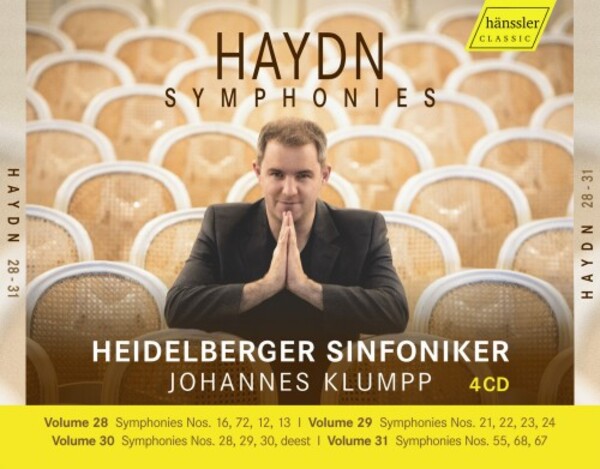HAYDN Symphonies Vols 28-31 (Klumpp)
View record and artist detailsRecord and Artist Details
Genre:
Orchestral
Label: Haenssler
Magazine Review Date: 05/2024
Media Format: CD or Download
Media Runtime: 298
Mastering:
DDD
Catalogue Number: HC23081

Tracks:
| Composition | Artist Credit |
|---|---|
| Symphony No. 16 |
Joseph Haydn, Composer
Heidelberg Symphony Orchestra Johannes Klumpp, Conductor |
| Symphony No. 72 |
Joseph Haydn, Composer
Heidelberg Symphony Orchestra Johannes Klumpp, Conductor |
| Symphony No. 12 |
Joseph Haydn, Composer
Heidelberg Symphony Orchestra Johannes Klumpp, Conductor |
| Symphony No. 13 |
Joseph Haydn, Composer
Heidelberg Symphony Orchestra Johannes Klumpp, Conductor |
| Symphony No. 21 |
Joseph Haydn, Composer
Heidelberg Symphony Orchestra Johannes Klumpp, Conductor |
| Symphony No. 22, 'Philosopher' |
Joseph Haydn, Composer
Heidelberg Symphony Orchestra Johannes Klumpp, Conductor |
| Symphony No. 23 |
Joseph Haydn, Composer
Heidelberg Symphony Orchestra Johannes Klumpp, Conductor |
| Symphony No. 24 |
Joseph Haydn, Composer
Heidelberg Symphony Orchestra Johannes Klumpp, Conductor |
| Symphony No. 2 |
Charles Ives, Composer
Heidelberg Symphony Orchestra Johannes Klumpp, Conductor |
| Symphony No. 29 |
Joseph Haydn, Composer
Heidelberg Symphony Orchestra Johannes Klumpp, Conductor |
| Symphony No. 30, 'Alleluja' |
Joseph Haydn, Composer
Heidelberg Symphony Orchestra Johannes Klumpp, Conductor |
| Symphony No. 55, 'Schoolmaster' |
Joseph Haydn, Composer
Heidelberg Symphony Orchestra Johannes Klumpp, Conductor |
| Symphony No. 68 |
Joseph Haydn, Composer
Heidelberg Symphony Orchestra Johannes Klumpp, Conductor |
| Symphony No. 67 |
Joseph Haydn, Composer
Heidelberg Symphony Orchestra Johannes Klumpp, Conductor |
Author: David Threasher
Like a sprinter lurching forwards to breast the tape, Johannes Klumpp announces that last spring he recorded the remaining symphonies to complete the Hänssler Haydn cycle. The final instalments will be packaged into two four-volume sets, of which this is the first, with a big box of all 35 discs to follow later this year.
Of course, recording all 100-odd of Haydn’s symphonies is a marathon, not a sprint, and this cycle (and the world) has changed since it was inaugurated a quarter of a century ago. Thomas Fey conducted the first 20-odd volumes, starting in 1999, but was then forced to relinquish the baton. After a brief interregnum, in which leader Benjamin Spillner took on directorial duties (including the Clock Symphony, No 101, to complete the ‘London’ Symphonies – 5/18), Johannes Klumpp has ascended the podium and continued Fey’s work very much in the style of his predecessor. Some constants remain: just as there was never anything fey about Fey’s approach to this music, there is nothing clumpy about Klumpp’s, either.
Neither is there any slackening of the collective virtuosity that has characterised the series. Presto, vivace and allegro molto are taken to extremes, as in the fast second movements of the two sinfonie da chiesa Nos 21 and 22, or the unexpectedly jubilant opening Allegro of No 23 in G. Minuets are no longer taken at the faintly ridiculous speeds that have recently been in vogue but generally maintain a mobile folkish lilt, predominantly at the livelier end of allegretto but leaning a little towards moderato when the music demands it, as in Symphonies Nos 24, 55 or 72. It’s a policy that reaps dividends in, for example, the canonic Minuet of No 23, which can so often come over as a dry intellectual game shorn of the Heidelbergers’ brilliant orchestral sound and response to Haydn’s ingenious effects, or in the trumpeting bariolage of No 28 or the abrasive spiccato and folk-fiddle runs in the A minor episode in No 30.
Symphony No 16 opens the set but is performed for some reason without its horn parts; listening to it alongside the newly remastered 1980 recording by L’Estro Armonico and Derek Solomons (see page 116) I rather missed them. They are restored to their rightful place in No 72, which follows, chuckling away and ushering in a sequence of solos showing off the Heidelberg players’ individual virtuosity in the best light. And in No 22, the Philosopher, they play properly fortissimo as instructed, sounding considerably less philosophical than the plangent cors anglais with which they alternate.
All repeats are taken, even in minuet reprises, gratifyingly so in outer movements but also in slow movements, some of which thus become the centre of gravity of their respective symphonies. There’s enough warmth and imaginative variation, though, to prevent them from sprawling, not least in a work such as No 68, whose Adagio is sufficiently cantabile to sustain its 13'20" running time. The Heidelbergers respond well, too, to the A major warmth that launches No 21 (with the Minuet that appears to anticipate Mozart’s Eine kleine Nachtmusik) and the E major richness of No 29.
There’s an unnumbered symphony as a bonus, its first two movements supposedly extracted from the (now lost) overture to L’infedeltà delusa, the added Minuet and finale sounding plausibly Haydnesque, at least in their fundamentals. That’s 96 down, 11 to go, by my calculations, and the auguries are good for the completion of this always thought-provoking, occasionally exasperating but never, never uninteresting series.
Discover the world's largest classical music catalogue with Presto Music.

Gramophone Digital Club
- Digital Edition
- Digital Archive
- Reviews Database
- Full website access
From £8.75 / month
Subscribe
Gramophone Full Club
- Print Edition
- Digital Edition
- Digital Archive
- Reviews Database
- Full website access
From £11.00 / month
Subscribe
If you are a library, university or other organisation that would be interested in an institutional subscription to Gramophone please click here for further information.




